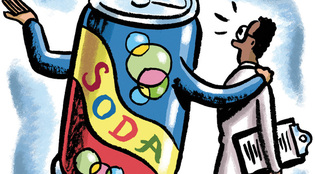 loading
loading
Light & VerityCritics question Pepsi partnership Michael SloanView full imageBeginning this fall, PepsiCo, the global food-and-beverage company—whose sales are dominated by soda and salty snacks, but also include such “good-for-you” brands as Quaker and Tropicana—will fund a graduate fellowship in nutritional science at the Yale School of Medicine. In a press release, medical school dean Robert Alpern heralded “PepsiCo’s commitment to improving health through proper nutrition” and called the partnership “a visionary investment in … the future of science.” But a handful of critics are troubled by the Yale-Pepsi combo. In a blog post, public health lawyer and author Michele Simon ’90MPH called the grant “sickening” and a “sell-out.” The San Francisco Chronicle catalogued it as part of an “odd melding of ‘junk food’ suppliers and groups that promote healthy living and research.” In response, a Wall Street Journal writer argued that Yale should “take that PepsiCo money proudly” and that the food industry shouldn’t be demonized. However, he also maintained that “when a business gets its name worked into the academic fabric of a school … [t]here is the implication that the firm is a partner in the intellectual enterprise.” Not true, says Yale. “There has been a huge disconnect between perception and reality,” Alpern says by e-mail. “There are numerous safeguards in place to protect the integrity of our research.” The $250,000, five-year grant will fund research by an MD/PhD student in the areas of obesity, diabetes, and metabolic syndrome. PepsiCo “will have no involvement in who is chosen for the fellowship, the research project to which the student is assigned, or the performance of the research,” including whether and where it is published, Alpern says. “Those decisions will be driven exclusively by Yale School of Medicine faculty.” In announcing the fellowship last December, PepsiCo also said it was opening a new research lab “to develop healthier products” at Science Park in New Haven, “adjacent to Yale’s campus.” Alpern says there is “no direct relationship” betwen the lab and Yale but that “interactions may develop between PepsiCo and our faculty.” Indeed, Pepsi has already sponsored “hydration and sensory science research projects in collaboration with Yale faculty who are affiliated with the Yale School of Medicine,” says Mark Pirner, the company’s director of clinical and scientific development strategy, via e-mail. (PepsiCo CEO Indra Nooyi ’80MBA is a trustee of the university.) Simon points out that Yale’s Rudd Center for Food Policy and Obesity—not affiliated with the medical school—is a prominent critic of the soda industry. Rudd Center director Kelly Brownell declines to comment on the PepsiCo fellowship. But three years ago, a Rudd study found that industry-sponsored soft-drink research showed “significantly smaller” health effects than other studies. “It is alarming,” Brownell said then, “that industry-funded studies so consistently favor industry and that these reports muddy what are otherwise clear waters.” The Rudd review “has no relevance” to the PepsiCo fellowship, maintains Yale spokesman Robin Hogen ’70: “This is a fellowship underwriting the education of an MD/PhD student—it is not underwriting a study.” “I’ve heard them all before,” Jerome Kassirer says of Yale’s arguments. “It doesn’t change my mind.” A professor at the Tufts School of Medicine, Kassirer is an expert on conflicts of interest in medical research. “The problem,” he says, is that “it’s impossible to know whether the money given to the school can in some way have an influence on what people in the nutrition department might say about PepsiCo products.”
The comment period has expired.
|
|